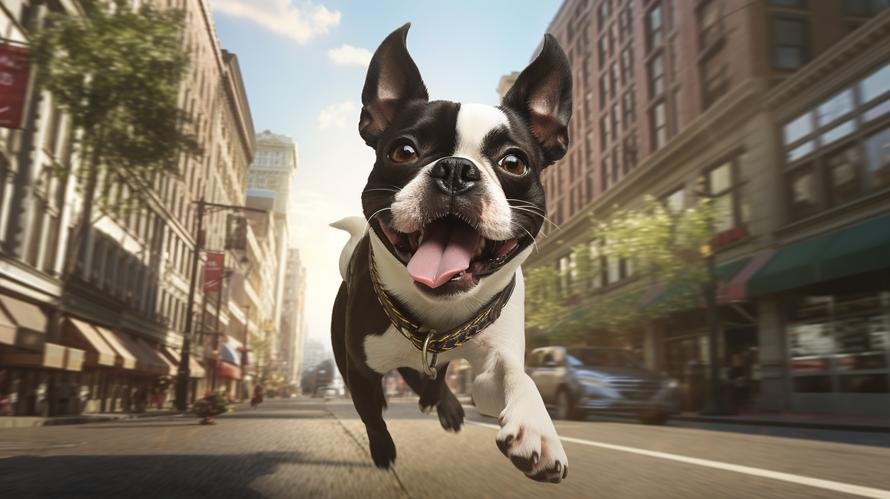Imagine going to a fancy restaurant and your waiter brings you the menu. You skim down the list – pasta, bread, pizzas, desserts galore… all filled with what we casually know as grains. Yum! Now imagine your cute Boston Terrier, wagging its tail, joining you for this feast. For us, it seems like a full course meal packed with flavorful and varied nutrients. But is it the same for our furry pals?
Before we dive into the core topic of whether Boston Terrier should eat grain-free, here’s an interesting trivia – did you know that Boston Terriers are nicknamed as “American Gentlemen”? This magnificent moniker comes from their necktie-like white chest markings layered upon tuxedo-like black coats and their exceptionally well-mannered behavior. Matching this status, their dietary plans should also be exquisite, shouldn’t they?
Now, coming back to the nitty-gritty of it all, let’s start by understanding what grains are. Grains, in basic terminology, encompasses wheat, corn, rice, barley, and oats. They’re abundant in several dietary components like fiber, protein, and various vitamins and minerals. They’re a staple in many human diets, given their convenience and nutritional profile.
However, in recent times, grain-free dog foods have become a sought-after diet for our canine friends. These diets usually replace grains with other source of carbohydrates like sweet potatoes or peas. Some market these as healthier alternatives, aligning with the surge in popularity for grain-free and gluten-free diets among humans. But is grain-free the golden gate pass for your Boston Terrier’s health?
You’ll be surprised to know that there’s a lot of contesting research on this issue. While the proponents of grain-inclusive diets swear by the balanced nutrient profile of grains, some underline the potential adverse impact, particularly on certain breeds such as Boston Terriers.
Before jumping to conclusions, we need to understand one critical fact – Boston Terriers and humans are different species altogether. While we share the love, affection, and uncountable adorable moments, our digestive systems function distinctly.
From the consuming end, Boston Terriers are closer to wolves than to us humans. Wolves, and hence man’s best friend, subsisted majorly on a meat-based diet. It’s only with their domestication that dogs have been introduced to plant-based and grain-filled ingredients. Physiologically, dogs have short intestinal tracts made for processing meat. Hence, their ability to digest grains completely and derive full nutritional benefits is put under question.
However, the plot thickens when we talk about allergies. According to a study by Purdue University, only 10% of all allergy cases in dogs are food allergies, and among these, grain allergies make up a tiny proportion. Most food allergies in dogs are due to beef, dairy, and chicken. So, if your Boston Terrier shows signs of itching, ear infections, or gastrointestinal problems, it’s possibly not the grain’s fault.
Now, you may feel like we’re playing tug-of-war with your decision-making process. The truth is, the grain-free versus grain-inclusive debate depends on several factors, including your individual dog’s needs, allergies, and overall health condition.
In some rare cases, an exclusive grain-free diet has been linked to a type of heart disease called Dilated Cardiomyopathy (DCM) in dogs. This illness widens a dog’s heart and decreases its ability to pump. It’s assumed that legume-rich, grain-free diets might restrict the absorption of an amino acid called taurine, essential for heart health.
So, what’s the ultimate take-away message here? The best diet for your Boston Terrier is one that meets their unique nutritional needs, which could vary based on their age, size, activity levels, and overall health status.
It’s always a good idea to work closely with your vet to establish your pup’s diet. They can offer valuable insights based on medical history, lifestyle, and regular check-ups.
Grains or no grains, your Boston Terrier’s needs healthy, nutrient-rich food. Transparently labeled contents, right proportion of proteins, fats, carbohydrates, and essential vitamins and minerals, a dash of omega fatty acids for that glossy fur, and of course, the portion controls are essential elements of your dog’s diet.
And finally, remember this – be it a vegetarian pizza or juicy steak, your Boston Terrier deserves more than just food; it deserves a balanced, mindful diet designed especially for its endurance and muscle build, carbohydrate needs, and overall well-being.
Because ultimately, the goal is not to feed them, but to nourish them. Happy feeding!



